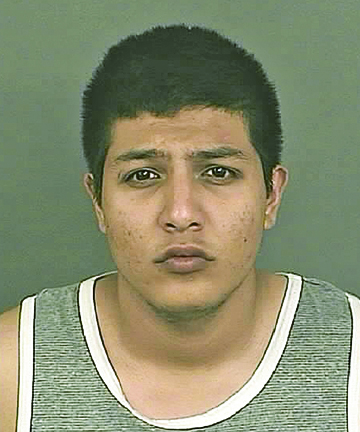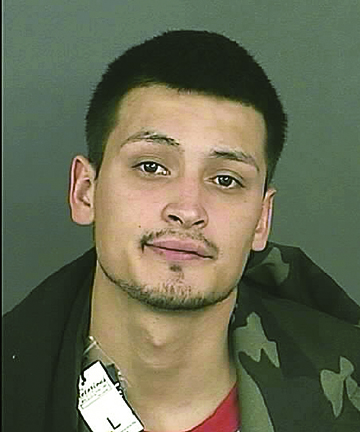Local Judges Provide ‘Get Out Of Jail Free Cards’ To Honduran And Mexican Drug Cartel Members
by Charles C. Bonniwell
The City and County of Denver has become, according to federal law enforcement authorities, one of the leading centers of heroin distribution in the entire western United States. One need only walk along the Cherry Creek Bike Path which is littered throughout with used heroin needles to bolster this assertion.
Colorado Attorney General Cynthia Coffman has declared, “Heroin use in Colorado has reached epidemic proportions, as witnessed by a thriving market for brown powder heroin and criminals willing to risk a lifetime in prison to profit from the demand in opioids.” Local authorities state that there has been a tenfold increase in heroin addiction and deaths in the last several years in Denver.
Local and federal drug enforcement agents also inform the Chronicle that the portion of Ms. Coffman’s statement concerning “a lifetime in prison” is not factually correct. In fact, in the City and County of Denver, Honduran and Mexican drug dealers have virtually no risk of any jail time even after having been arrested for heroin dealing multiple times due to bail procedures adopted by Denver courts as they apply to individuals in the United States illegally.
According to Barbra Roach, Special Agent in Charge of the Denver Region for the federal Drug Enforcement Agency, the Sinaloa drug cartel based in northern Mexico and once run by El Chapo Guzmán controls hero in distribution in Denver and throughout Colorado. Roach states that “the Sinaloa cartel is in control of the Denver area.”
in distribution in Denver and throughout Colorado. Roach states that “the Sinaloa cartel is in control of the Denver area.”
The cartel utilizes 17- to 20-year-old Honduran and Mexican nationals it transports to Denver to distribute the deadly drug. If a cartel member is arrested for heroin distribution by the Denver police he is taken to the City and County jail where bail is determined by the Denver County Court system headed up by Presiding Judge John Marcucci. At the bail hearing it is deemed irrelevant that the cartel member is in the country illegally, that he has no known address or any valid identification or even the severity of the crime. Given the fact that most cartel members are taught to state that they are indigent, no bail is req uired of any amount and the cartel drug member is released on his own personal recognizance (PR) which one drug enforcement agent called it little more than a “pinky swear” to return to court.
uired of any amount and the cartel drug member is released on his own personal recognizance (PR) which one drug enforcement agent called it little more than a “pinky swear” to return to court.
The cartel members, of course, seldom show up for their next hearing. While many of those arrested would then be moved on to another city by the cartel to distribute heroin the situation has gotten so egregious in Denver that few bother. The mere fact that you have failed to previously appear for a court hearing is also not considered at the subsequent bail hearing if you are arrested once again. Thus cartel members are regularly arrested for heroin distribution, released on personal recognizance bond, fail to appear for the next hearing, be arrested again and then released again in a never ending revolving door.
Since Denver is a “sanctuary city” legal status of someone arrested is never sought to be determined and if known never conveyed back to federal immigration authorities. Thus there are advantages for Sinaloa cartel members to admit they are here illegally and have no permanent address or place of abode in the United States.
According to a report by KDVR Channel 31, over the last several months, 26 heroin dealers have been arrested in Denver and have asserted they were here illegally from Honduras or Mexico. Seventeen of these dealers were released on personal recognizance and 14 of those did not return for their next hearing.
One such person was Armando Diaz, age 21, arrested on April 30, 2016, at a routine traffic stop. Diaz had no ownership paperwork for the vehicle o r any driver’s license and the VIN number on the automobile had been altered. In the car was a bag containing methamphetamine as well as a large quantity of money in separate bundles along with a brick of narcotics. Also there were socks filled with narcotics in the glove compartment. Searched at the jail, Diaz had a small bag of heroin visibly hanging from his rectum. Several hours later Diaz was released on a PR bond never to return.
r any driver’s license and the VIN number on the automobile had been altered. In the car was a bag containing methamphetamine as well as a large quantity of money in separate bundles along with a brick of narcotics. Also there were socks filled with narcotics in the glove compartment. Searched at the jail, Diaz had a small bag of heroin visibly hanging from his rectum. Several hours later Diaz was released on a PR bond never to return.
Another one of those individuals was 20-year-old Sergio Garcia Reyes who was arrested in June of this year with a balloon of heroin in his mouth as well as containers in his glove box. The car he was driving had a fake temporary license plate and the only identification he had was apparently a fake one from Mexico. He did not speak English but through an interpreter stated he had been in the United States for two months. He was quickly released on personal recognizance. He failed to appear for his arraignment, but was rearrested in August. Somewhat amazingly this time bond was set at $2,000 which the asserted indigent Reyes quickly had posted by another apparent cartel member and he has not been heard from since.
Heroin distribution is not a victimless crime. Matt Lazarus, son of Denver resident Chris Lazarus, was sold a lethal dose of heroin by a Honduran cartel member. She stated “they are putting the people that killed my son . . . back on the streets. Why in the world would you let them go?”
Denver term-limited District Attorney (DA) Mitch Morrissey blames the local judges and, in particular, County Court Presiding Judge John Marcucci. He told Channel 31, “It’s the judge that’s responsible for what happens after they give someone a PR bond.” Essentially, the DA argues, the local Denver judges have made heroin distribution legal in Denver if performed by some cartel members here illegally from Honduras or Mexico which in turn fuels
the local judges and, in particular, County Court Presiding Judge John Marcucci. He told Channel 31, “It’s the judge that’s responsible for what happens after they give someone a PR bond.” Essentially, the DA argues, the local Denver judges have made heroin distribution legal in Denver if performed by some cartel members here illegally from Honduras or Mexico which in turn fuels  the heroin in Denver and throughout Colorado.
the heroin in Denver and throughout Colorado.
Judge Marcucci, in turn, apparently blames Denver District Attorney (DA) Mitch Morrissey who he deems to be a duplicitous individual stating that the DA never sends anyone to the bail hearings to demand a fiscal bond even though there are public defenders there demanding that the suspect be released on his own personal recognizance. Marcucci also points out when county court judges were sued in Denver District Court in 2013 for requiring fiscal bonds, Morrissey’s office refused to defend them and left the matter to the largely incompetent City Attorney’s Office who lost the case.
Both blame the system stating that the Colorado State statute determines what can be considered in a bail hearing. Moreover, the United States Justice Department has argued in a federal court case that requiring a fiscal bond of any kind for a person alleging that he is indigent may be a violation of the U.S. Constitution.
But Arapahoe County District Attorney George Brauchler points out in no other judicial district other than the City and County of Denver are heroin dealers routinely let go on personal recognizance bonds.
In the meantime, the heroin epidemic grows and grows and an increasing number of young people are dying of lethal heroin dosages in the City and County of Denver and throughout Colorado. As stated about the ever increasing death toll from the AIDs epidemic in the 1980s, “the band plays on” while local authorities simply point fingers.
